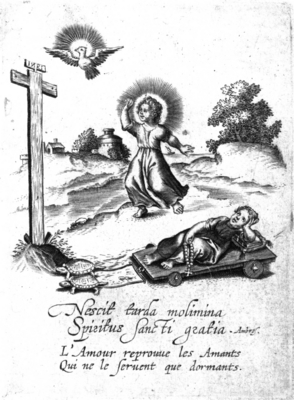Ludovicus van Leuven, Amoris divini et humani antipathia (1629)
Table of contents ↑Torpor Amoris [23]

XXIII.
Leo.
Beda.
Sallust.
Nil Amore callidius, nil aduersario nequius;
quoties aliquem in scelus aliquod pellicit,
non statim formatum ac suis depictum coloribus
id ipsum proponit, sed â paruis fere initijs, non
tam malis, quam ad malum in sensibili quodam
modo vergentibus, rem orditur, atque ita sensim
vlterius progrediendo, id, quod intendit, patrat.
nemo repentè fuit turpissimus. Dauidem in ho-
micidium propellere dum vult, si rect à eo tendat,
horrebit nomen sceleris, bonus Rex. oculum ita-
que primo suggerit vagantem curiosum, mox o-
tium, mox incuriam, mox torporem, ex quibus
ortâ libidine, suggerit & adulterium; denique
istis præmissis, vt necessarium, infert homici-
dium. omne peccatum, superbum est, amat asse-
clam. fuge igitur torporem, o Anima, si vis vt
non aufugiat à te spiritus sancti gratia. surge,
propera amica mea, non enim dormientibus pro-
uenit regnum cœlorum, nec otio & desidiâ tor-
pentibus beatitudo æternitatis repromittitur. qui
vult regnare cum Deo, debet laborare pro Deo.
doceat te paganus, vbi socordiæ atque ignauiæ te
tradideris, nequicquam Deos implores, irati enim
infensiqueue sunt.
Nil Amore callidius, nil aduersario nequius;
quoties aliquem in scelus aliquod pellicit,
non statim formatum ac suis depictum coloribus
id ipsum proponit, sed â paruis fere initijs, non
tam malis, quam ad malum in sensibili quodam
modo vergentibus, rem orditur, atque ita sensim
vlterius progrediendo, id, quod intendit, patrat.
nemo repentè fuit turpissimus. Dauidem in ho-
micidium propellere dum vult, si rect à eo tendat,
horrebit nomen sceleris, bonus Rex. oculum ita-
que primo suggerit vagantem curiosum, mox o-
tium, mox incuriam, mox torporem, ex quibus
ortâ libidine, suggerit & adulterium; denique
istis præmissis, vt necessarium, infert homici-
dium. omne peccatum, superbum est, amat asse-
clam. fuge igitur torporem, o Anima, si vis vt
non aufugiat à te spiritus sancti gratia. surge,
propera amica mea, non enim dormientibus pro-
uenit regnum cœlorum, nec otio & desidiâ tor-
pentibus beatitudo æternitatis repromittitur. qui
vult regnare cum Deo, debet laborare pro Deo.
doceat te paganus, vbi socordiæ atque ignauiæ te
tradideris, nequicquam Deos implores, irati enim
infensiqueue sunt.

Paresse de l'Amour.
XXIII.
Pouquoy crois tu, qu' Amour porte des aisles,
Carquois, & traits, fleches, plumes isnelles,
Ne veois tu pas que cest qu' il est soudain?
Iamais l'Amour, n'aima lente poursuitte,
Sus, leue toy, auance, & va plus viste,
Car autrement cest le chercher en vain,
XXIII.
Pouquoy crois tu, qu' Amour porte des aisles,
Carquois, & traits, fleches, plumes isnelles,
Ne veois tu pas que cest qu' il est soudain?
Iamais l'Amour, n'aima lente poursuitte,
Sus, leue toy, auance, & va plus viste,
Car autrement cest le chercher en vain,
Translations
 |
The lethargy of love. |
 |
The grace of the Holy Spirit does not know slow undertakings. |
Sources and parallels
-
Possibly based on, different motto, background landscape and an inscription tablet on the cross added, in: Desidia amoris mundani. [7]
 (in: anonymous, Amoris divini et humani antipathia (1628)
(in: anonymous, Amoris divini et humani antipathia (1628) )
[Compare
)
[Compare ]
]
-
Similar pictura (but lying woman without rosary), the same Latin quotation of Ambrosius and the same French epigram,
in:Men jaagt zomtijds voor een ander [30]
 (in: Willem den Elger, Zinne-beelden der liefde (1703)
(in: Willem den Elger, Zinne-beelden der liefde (1703) )
[Compare
)
[Compare ]
]
-
Similar pictura (but lying woman without a rosary), the same Latin quotation of Ambrosius and the same French epigram,
in:Regt, en voorwaars [32]
 (in: Jan van Hoogstraten, Zegepraal der goddelyke liefde (1709)
(in: Jan van Hoogstraten, Zegepraal der goddelyke liefde (1709) )
[Compare
)
[Compare ]
]
References, across this site, to this page:
- Desidia amoris mundani. [7]
 (in: anonymous, Amoris divini et humani antipathia (1628)
(in: anonymous, Amoris divini et humani antipathia (1628) )
)
- Men jaagt zomtijds voor een ander [30]
 (in: Willem den Elger, Zinne-beelden der liefde (1703)
(in: Willem den Elger, Zinne-beelden der liefde (1703) )
)
- Regt, en voorwaars [32]
 (in: Jan van Hoogstraten, Zegepraal der goddelyke liefde (1709)
(in: Jan van Hoogstraten, Zegepraal der goddelyke liefde (1709) )
)

